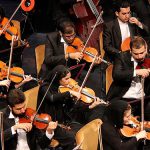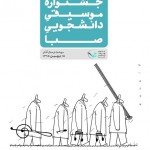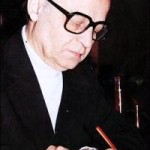Simorgh (Simorq) Orchestra was founded by the renowned Iranian composer, Hamid Motebassem, in 2011. Simorgh Orchestra is the largest orchestra featuring Iranian national instruments. Although the orchestra established by Master Hossein Dehlavi, the great Iranian composer, in 1993 was larger than Simorgh Orchestra, it only featured the Iranian plucked string instruments unlike the latter one. The first album which was recorded by the Orchestra, conducted under Motebassem’s baton, was his Simorq based on Zal story from Shahnameh by Ferdowsi, the great Iranian poet.
Tag Archives: Motebassem
Latest posts
- Transition to Enlightenment: Six Lectures on Mozart’s String Quartets (5)
- Nasser Masoudi: The Voice of Gilan and a Legacy of Iranian Music
- Farhad Poupel: The Voice of the Shahnameh in the Orchestras Around the World
- Five Major Myths About Mozart’s Life
- Bahma Rajabi Passed Away!
- Reza Vohdani; Unveiling unpublished works, preservation of Iranian classical music
- Ahmad Pejman Passed Away!
- Timeless or Timely: The Role of Historical Context in Defining Artistic Value
- Leading the Charge in Censorship
- The Legacy of Khosrow Jafarzadeh
- Transition to Enlightenment: Six Lectures on Mozart’s String Quartets (4)
- Fereydoun Shahbazian, An Iranian Musical Icon Passed Away
From Past Days…

Maestro Hassan Nahid’s Role in Promoting the Ney
Maestro Hassan Nahid is one of the most prominent and distinctive artists who values high morals, discipline and hard work. His music activities include playing the Ney as both soloist and an accompaniment in the most important Iranian music orchestras and ensembles during the last fifty years, including the Orchestra of Iranian Instruments (Nusratullah Golpayegani), the Orchestra of National Instrumentalists of the Ministry of Culture and Arts (Payvar Orchestra), the Orchestra of Iranian Instruments (Morteza Hananeh) , Darvish Orchestra, Samaie Orchestra, Roudaki Orchestra, Maestros’ Ensemble, Aref Ensemble, as well as performances in various radio programs, many concerts in different countries, as well as a long teaching experience in the National Conservatory of Music, music universities and other music institutions to name but a few.

The response of the fired musicians to the interview of the managing director of Rudaki Foundation
Following an interview by Mehdi Salem, the director of the Rudaki Foundation, with the “Our Music” website, a response from the dismissed musicians was published in response to this conversation, which you read:

A Miracle in the Iranian Music: About Tehran Flute Choir’s Eight-year Tenacity
Tehran Flute Choir is a 40-member orchestra of Iran’s best flutists; Iran’s best flutists? Yes! If you write down the names of the greatest Iranian flute players who participate at concerts and contribute to academic centers in Iran, you will see that most of them are among the choir’s members.

Transition to Enlightenment: Six Lectures on Mozart’s String Quartets (3)
Wolfgang Amadeus Mozart, a musical prodigy of the Classical era, was deeply influenced by the intellectual currents of the Enlightenment. His exposure to Enlightenment ideas was multifaceted, shaped not only by the cultural milieu of his time but also by the relationships within his family and his own interactions with prominent figures of the Enlightenment. This exploration will delve into Mozart’s acquaintance with Enlightenment ideas through his father’s relationships and his own encounters with influential personalities of the era, including Christian Fürchtegott Gellert, Baron Melchior Grimm, Madame d’Epinay, and Joseph von Sonnenfels. Additionally, the essay will examine the impact of Joseph II’s reforms on Mozart’s life and artistic endeavors.

Jamshid Andalibi passed away!
Jamshid Andalibi, one of the most famous ney players in Iran, passed away on the fifteenth of Esfand, 1402, at the age of 66 due to a heart attack at his private residence. Andalibi was a member of a family that had a significant presence in the field of Iranian music in the sixties and…
Read More

Ali Rahbari & Recording Iranian Symphonic Compositions
In the few days prior to the New Iranian year (March 2015), the news of the revival of Tehran Symphony Orchestra under Ali (Alexander) Rahbari’s conductorship was announced. Ali Rahbari, who served as assistant to Herbert von Karajan in Berlin Philharmonic Orchestra at a very young age, was also invited to conduct Tehran Symphony Orchestra in 2005; however, the election of Mahmoud Ahmadinejad’s government put an end to his collaboration with this Orchestra. Recently, it was announced that Rahbari is invited to conduct an orchestra in the U.S.

The First Saba Student Music Festival Concluded in Tehran
Preparations for Saba Student Music Festival started in the summer of 2016; the Student Music Festival will be held annually by the students of music at Arts University. The first part of the closing ceremony of the Festival was dedicated to the celebration of the life, work and strives by Maestro Hossein Dehlavi to upgrade the level of music as an academic discipline. The name of the award-winning students and ensembles were announced at the second part of the ceremony.

Hossein Dehlavi: the Composer
With Dehlavi it is not all about fame but recognition. Hossein Dehlavi is not a popular musician (like pop singers) whom everybody might know when he is walking on streets of Tehran; however, he is recognized by both amateur and distinguished musicians of the country.

HarmonyTalk Celebrates 11th Anniversary
April 6 marks the anniversary of launching HarmonyTalk.com. Back in 2004, HarmonyTalk was rather a blog dedicated to music. Gradually, however, it found its way to becoming a more sophisticated journal with an intensive but not exclusive concentration on classical music.

“Symphonic Poems from Persia” Released in Germany
While the name “Persia” (Western historical name of Iran) has attracted tens of thousands of people from around the world to London’s British Museum to visit ancient Persian artifacts, the Nuremberg-based music company, Colosseum, invites Europeans to listen to eight masterpieces of Persian symphonic music.